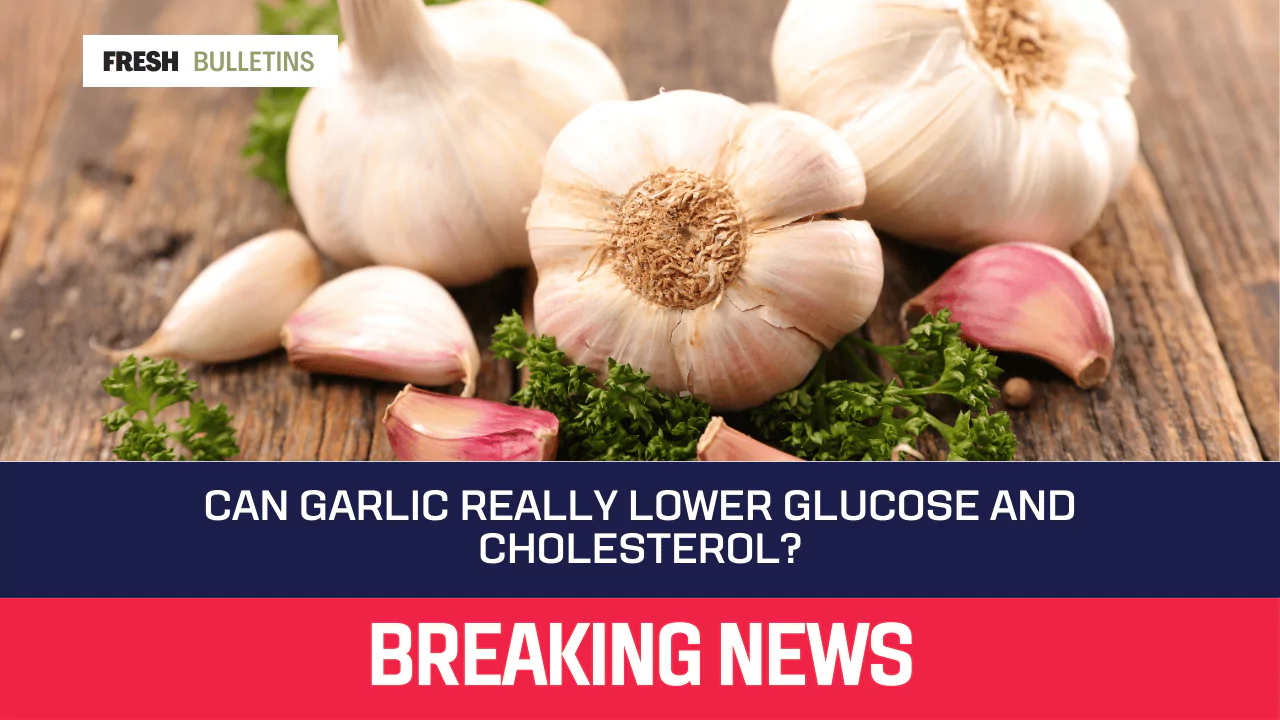Can Garlic Really Lower Glucose And Cholesterol?
Yes, some studies suggest that garlic may help lower blood glucose and cholesterol levels.
Garlic, a highly esteemed culinary ingredient, has gained widespread recognition for its potential health-enhancing characteristics over an extended period.
Studies conducted in 2006 and 2016 indicate that garlic may have the ability to reduce glucose and cholesterol levels. Research findings suggest that the consumption of raw garlic could play a pivotal role in lowering these levels, presenting a natural and palatable method to potentially enhance overall well-being.
Further examination of the benefits associated with incorporating garlic into one’s daily dietary regimen will be discussed in depth.
The Health Benefits of Garlic
Garlic, recognized for its potent aroma and flavor, has been the subject of extensive research by scholars due to its potential health benefits, which encompass its contribution to mitigating the risk of cardiovascular disease, diabetes, and various other chronic illnesses.
Impact on Cardiovascular Health
Garlic has demonstrated a positive impact on cardiovascular health by mitigating risk factors such as high cholesterol, blood pressure, and triglycerides.
Numerous studies have suggested that garlic comprises compounds like allicin that could contribute to the reduction of LDL cholesterol levels while simultaneously augmenting the beneficial HDL cholesterol. Additionally, research has proposed that garlic has the potential to lower blood pressure by fostering vasodilation and diminishing inflammation. Allicin, a component of garlic, may also be instrumental in decreasing triglyceride levels, a form of fat in the blood associated with cardiovascular issues. Clinical trials have furnished evidence supporting garlic’s capacity to enhance various indicators of cardiovascular health and reduce the overall susceptibility to heart disease.
Garlic and Diabetes Management
Research studies have indicated that garlic exhibits potential in the management of diabetes through the regulation of blood sugar levels and enhancement of insulin sensitivity. Garlic is rich in bioactive compounds, notably allicin, that have demonstrated efficacy in reducing blood glucose levels by stimulating insulin secretion and improving insulin sensitivity.
A study published in the Journal of Medicinal Food documented the significant impact of garlic supplementation on lowering fasting blood glucose levels and ameliorating insulin resistance in diabetic rats. Additionally, findings from another study published in the Journal of Nutrition revealed that garlic extracts possess antioxidant properties capable of safeguarding pancreatic beta cells – crucial for insulin production – from damage induced by elevated blood sugar levels.
The collective evidence from these studies suggests that the inclusion of garlic in the dietary regimen holds promise in conferring potential benefits for individuals grappling with diabetes.
Antioxidant and Anti-inflammatory Properties
Garlic is recognized for its potent antioxidants and anti-inflammatory properties, which contribute to reducing oxidative stress and fortifying the immune system.
These antioxidants found in garlic, notably allicin, diallyl disulfide, and s-allyl cysteine, serve a pivotal function in counteracting detrimental free radicals within the body. By mitigating oxidative stress, garlic aids in diminishing the susceptibility to chronic illnesses like heart disease and cancer.
Furthermore, the anti-inflammatory components of garlic assist in alleviating inflammation, a factor associated with ailments such as arthritis and diabetes. The integration of garlic into one’s dietary regimen presents a palatable avenue for enhancing overall health and well-being.
Scientific Evidence Supporting Garlic’s Health Benefits
Numerous studies, comprising randomized controlled trials and meta-analyses, offer compelling evidence substantiating the health benefits associated with garlic, particularly in the realms of reducing cholesterol levels and managing blood sugar.
Key Studies and Trials
Multiple significant studies and randomized controlled trials have demonstrated that regular consumption of garlic can markedly decrease cholesterol levels, blood glucose, and triglycerides.
For example, a study published in the Journal of Nutrition reported that individuals who consumed garlic extract daily experienced a noteworthy reduction in LDL cholesterol levels. Similarly, a clinical trial conducted by the American Journal of Clinical Nutrition indicated that garlic supplementation resulted in a significant decrease in fasting blood sugar levels. Furthermore, research published in the Journal of Nutrition and Metabolism emphasized the favorable impact of garlic in lowering triglyceride levels among individuals with elevated levels.
Collectively, these findings suggest that integrating garlic into one’s dietary regimen may provide substantial cardiovascular health benefits.
Meta-analyses and Systematic Reviews
Meta-analyses and systematic reviews have synthesized data from multiple studies, providing compelling evidence of garlic’s efficacy in reducing cardiovascular risk factors and enhancing overall health.
These thorough reviews have underscored garlic’s strong anti-inflammatory and antioxidant attributes, which are pivotal in reducing blood pressure and cholesterol levels. Research indicates that consistent intake of garlic can enhance immune function, mitigate the likelihood of specific cancers, and bolster cognitive performance.
The implications of these conclusions propose that integrating garlic into one’s dietary regimen or utilizing garlic supplements could yield substantial health advantages, particularly in the treatment and prevention of chronic illnesses.
Forms of Garlic and Their Efficacy
Garlic can be ingested through a variety of mediums, such as raw garlic, garlic powder, garlic extract, and garlic tablets, each exhibiting distinct levels of allicin bioavailability and effectiveness in conveying health advantages.
Raw Garlic vs. Processed Forms
Raw garlic generally exhibits greater allicin bioavailability in comparison to processed variations such as garlic powder and garlic extract, thereby influencing their overall health efficacy.
When garlic undergoes processes like chopping, crushing, or chewing, the enzyme aliinase facilitates the conversion of alliin into allicin, the constituent responsible for numerous health-enhancing properties of garlic. This enzymatic conversion process is hindered in certain processed forms like powders and extracts, resulting in diminished allicin levels. Consequently, raw garlic is often acknowledged for its heightened potency in terms of medicinal attributes.
The bioavailability of allicin plays a pivotal role in determining the extent to which the compound can be absorbed and utilized by the body, consequently impacting the health advantages derived from the consumption of garlic.
Choosing the Right Garlic Supplement
When determining the most suitable garlic supplement, one must take into account various factors such as allicin content, bioavailability, and the specific health objectives to be achieved.
Allicin, a crucial compound found in garlic, contributes significantly to its various health advantages. When choosing a garlic supplement, it is advisable to select one with a standardized allicin content to ensure its effectiveness. The supplement’s bioavailability, which refers to the body’s ability to absorb and utilize the nutrients effectively, should also be considered. Opting for supplements with enhanced bioavailability, such as those containing black garlic or aged garlic extract, can be beneficial. Adhering to the recommended dosage instructions is essential in order to optimize the health benefits derived from garlic supplements.
Potential Side Effects and Precautions
Although garlic offers various health advantages, it is crucial to acknowledge the potential side effects and precautions associated with its consumption. These may include garlic allergy, gastrointestinal problems, and interactions with blood-thinning medications.
Common Side Effects
Common gastrointestinal side effects associated with garlic consumption include heartburn, nausea, and the development of a strong odor. Additionally, individuals may encounter symptoms such as bloating or diarrhea following the ingestion of garlic. To mitigate these effects while still obtaining the health benefits attributed to garlic, there exist various strategies that can be implemented.
One effective approach involves the utilization of cooking methods such as roasting or sautéing garlic, as these techniques can aid in diminishing its pungent properties. Alternatively, individuals may opt to incorporate garlic supplements in the form of pills or capsules, which are often easier on the digestive system. Gradually introducing small quantities of garlic into one’s diet and incrementally increasing the dosage over time can also assist the body in acclimating to this ingredient.
For those individuals concerned about the lingering strong odor associated with garlic consumption, it is recommended to chew on fresh parsley or mint leaves post-consumption to help alleviate any undesirable breath odors.
Interactions with Medications
Garlic has the potential to interact with specific medications, particularly those classified as blood thinners, necessitating caution and consultation with a healthcare professional.
Such interactions have the capacity to influence the efficacy of medications such as antiplatelet drugs or anticoagulants. Garlic comprises compounds that may elevate the risk of bleeding when coadministered with these medications. Furthermore, garlic supplements have the potential to impede the effectiveness of certain antibiotics, immunosuppressants, as well as medications aimed at regulating blood pressure or cholesterol levels.
It is imperative to disclose any garlic supplements being consumed to your healthcare provider to ensure a safe and efficacious treatment regimen. Proper consultation can aid in averting potential adverse effects and guarantee the optimal functionality of your prescribed medications.
Who Should Avoid Garlic?
Individuals who have a garlic allergy, severe gastrointestinal issues, or are taking certain medications should evaluate the suitability of consuming garlic or seek guidance from a healthcare provider prior to ingestion.
It is essential to exercise caution when consuming garlic in any form if one has a known garlic allergy or experiences significant gastrointestinal complications. It is advisable for individuals who are taking specific medications, such as blood thinners or those for high blood pressure, to consult with a healthcare professional prior to incorporating garlic into their diet. It is essential to obtain personalized medical advice to ensure personal safety and well-being, as there are potential interactions between garlic and specific medications.







